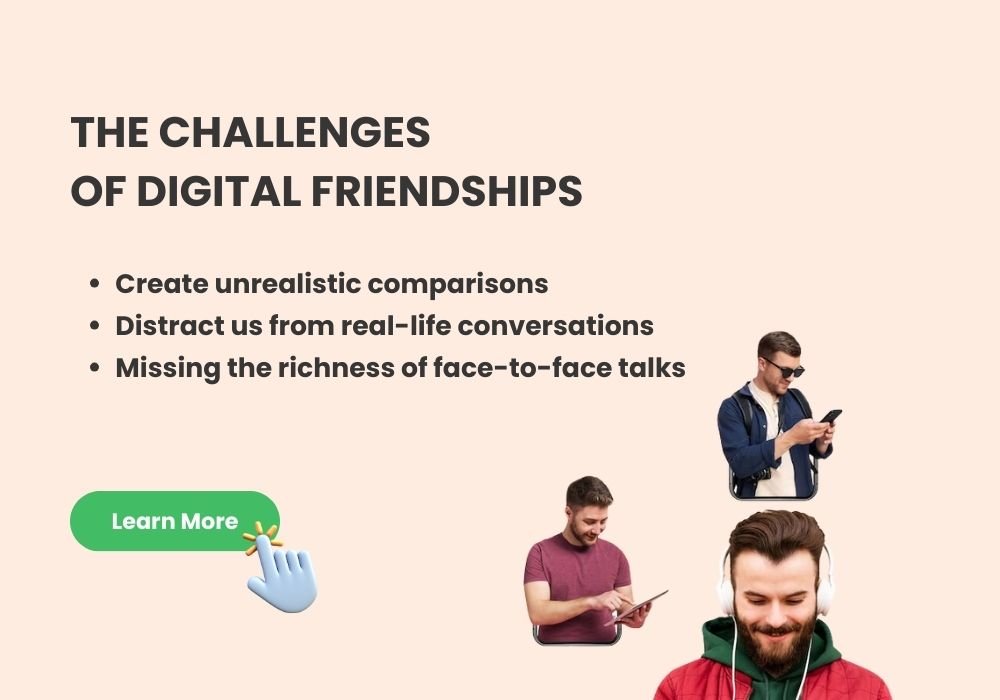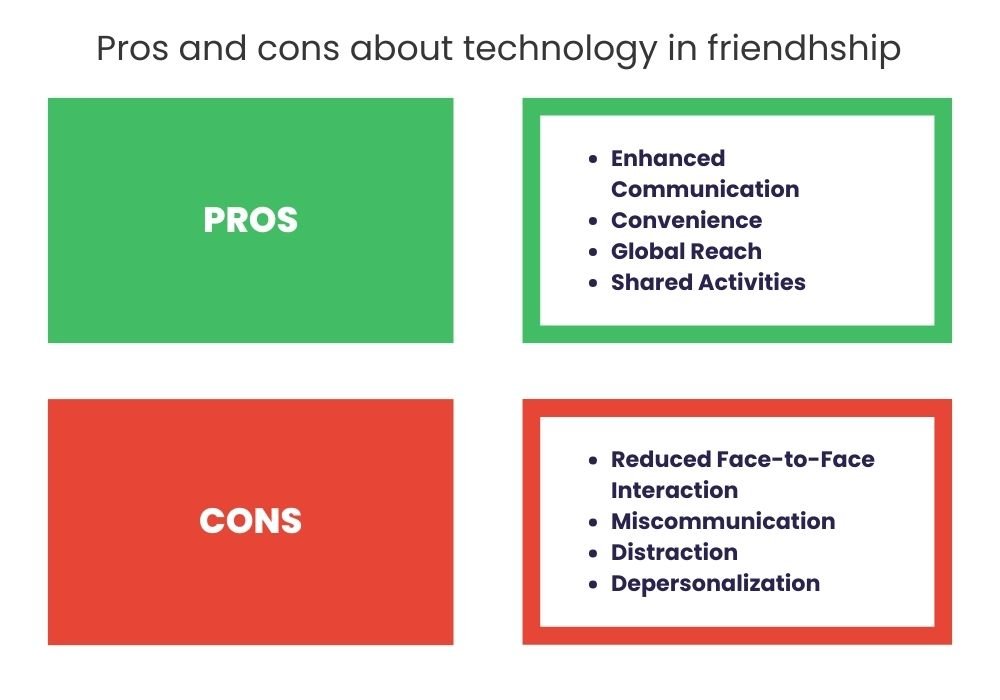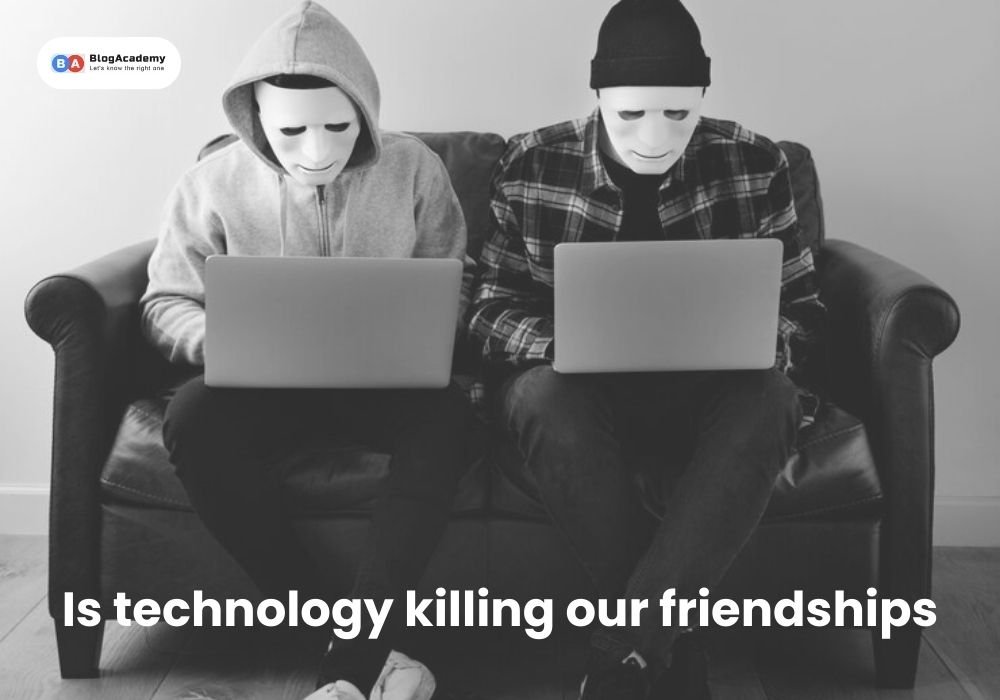In the 21st century, technology has seamlessly woven itself into the fabric of our daily lives. In today’s fast-paced, digital world, technology has become an integral part of our lives.
We rely on smartphones, social media, and messaging apps to stay connected with others, but is technology killing our friendships? This question has been a subject of debate and concern for many, and in this blog post, we will explore the impact of technology on our friendships.
Technology killing our friendships
Technology’s impact on friendships is a double-edged sword. While it offers convenience, it can erode the depth of relationships. Excessive screen time replaces face-to-face interaction, leading to superficial connections and feelings of isolation. Social media’s highlight reel fosters envy and comparison, straining genuine bonds.
To remedy this, balancing screen use, prioritizing real-time communication, and nurturing quality over quantity in friendships is vital. By consciously choosing meaningful interactions and limiting technology’s influence, we can safeguard our friendships from being eclipsed by its downsides.
Do you think friendship have changed because of technology?
Yes, technology has significantly impacted friendships. Social media, messaging apps, and online communication have transformed how we stay connected. It’s easier to maintain relationships regardless of distance, allowing frequent communication and quick interactions.
However, technology can also affect the quality of friendships. Sometimes, face-to-face interactions are replaced by screen time, potentially leading to misunderstandings or a lack of deeper, personal connections.
The constant connectivity might create a sense of being close while actually being distant. Nonetheless, technology offers opportunities to meet new people, share experiences, and create global connections.
Ultimately, the impact of technology on friendships depends on how it’s utilized—balancing online communication with in-person interaction is essential for maintaining strong and meaningful relationships.
The Challenges of Digital Friendships

However, technology brings some problems that affect the quality of our friendships.
Social media often shows the best parts of people’s lives, making it easy to think that’s all there is. This can create unrealistic comparisons and stop us from forming genuine connections.
Smartphones and social media notifications can distract us from real-life conversations. This constant virtual world engagement can distance us from those physically around us.
In-depth conversations often give way to quick texts or comments, missing the richness of face-to-face talks. Also, online communication lacks non-verbal cues, causing misunderstandings.
Tech overuse can lead to addiction and isolation. Too much screen time might make us anxious and affect how we socialize in real life.
The Role of Technology in Friendship
Technology has undeniably revolutionized how we maintain relationships. The ability to connect with friends from across the globe instantly is a marvel that was unthinkable not so long ago. Social media platforms like Facebook, Instagram, and Twitter allow us to share our lives, thoughts, and experiences with friends, keeping us updated with each other’s lives despite geographical barriers.
Likewise, messaging apps such as WhatsApp, iMessage, and Messenger enable us to chat in real time, ensuring a constant line of communication with our friends, irrespective of the distance between us. Video calls, through platforms like Zoom and Skype, have made face-to-face interactions possible, even when separated by thousands of miles.
Yet, amidst the convenience and connectedness, technology has a darker side that has been scrutinized for its impact on friendships.
Is technology killing our friendships pros and cons?

Technology has significantly impacted friendships, presenting both pros and cons.
Pros:
- Enhanced Communication: Technology allows us to stay in touch regardless of distance, fostering connections.
- Convenience: Platforms like social media and messaging apps make it easy to reach out to friends quickly.
- Global Reach: It enables connections with people worldwide, broadening our social circles.
- Shared Activities: Online gaming or video calls create opportunities for shared experiences.
Cons:
- Reduced Face-to-Face Interaction: Over-reliance on technology may decrease in-person socializing.
- Miscommunication: Lack of tone or body language in digital communication can lead to misunderstandings.
- Distraction: Excessive screen time might divert attention away from personal interactions.
- Depersonalization: Virtual connections might lack the depth and intimacy of real-life relationships.
In summary, while technology provides accessibility and broader connections, it can also impede the depth and quality of personal interactions, demanding a balance between digital and real-world connections for healthy friendships.
Is technology our friend or enemy?
Technology can be both a good friend and a tricky foe. It’s friendly when it helps us, making things easier and connecting us with others. It’s great for learning and improving how we communicate and get healthcare.
But if we use technology too much or in the wrong way, it can turn against us. Spending too much time on screens can hurt our health and make us feel alone. Also, some people can use technology to do bad things like stealing or spying on others.
So, whether technology is helpful or harmful depends on how we use it. If we’re careful and use it wisely, it can be a good friend. But if we’re not careful, it might cause problems. That’s why using technology responsibly is really important.
How technology is hurting friendships?
Technology sometimes makes friendships harder. Too much time on phones or computers can stop us from spending time together. Social media meant to bring us closer, can make us feel bad about ourselves when we compare our lives to others.
When we’re with friends, looking at screens can stop us from talking and connecting. Messages can be misunderstood, causing fights. Depending too much on technology for talking can make friendships feel less personal and distant. Finding a balance between online and real-life time is important to keep friendships strong and meaningful.
In Conclusion
Technology has changed how we make friends and keep in touch. While it offers great connectivity, it also brings challenges to forming genuine friendships.
We must learn to use technology as a tool, not a replacement for real connections.
Being mindful of our digital use, nurturing offline relationships, and focusing on meaningful interactions can help us balance the impact of technology on our friendships.
Friendship is a deeply human experience that goes beyond screens. As we navigate the digital world, let’s remember to nurture true connections that enrich our lives in ways technology cannot replicate.



